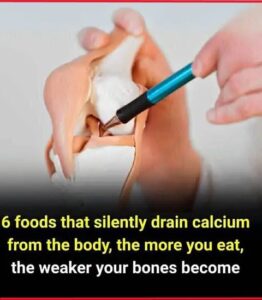6 Everyday Foods That Secretly Rob Your Body of Calcium — Leaving Your Bones Fragile Over Time

Calcium is often called the building block of strong bones, but its role goes far beyond your skeleton. This vital mineral supports heart health, muscle function, and the nervous system. In fact, more than 99% of calcium in the human body is stored in bones and teeth, while the rest helps regulate essential processes like nerve signals, blood flow, and muscle contraction.
Since the body can’t make calcium on its own, we rely entirely on food, drinks, or supplements to meet our daily needs. Dairy products, leafy greens, nuts, and fortified plant-based milks are reliable sources—but what many people don’t realize is that some foods and drinks can actually drain calcium from your body or block its absorption. Over time, this can weaken bones and increase the risk of fractures or osteoporosis.
Below are six surprising culprits you may want to limit:
1. Soda and Colas
Cola drinks are one of the biggest offenders. They contain phosphoric acid, which interferes with calcium absorption. Add in the large amounts of sugar that trigger inflammation, and the result is a gradual decline in bone strength. Long-term soda drinkers face a higher risk of osteoporosis. Opt for water, herbal teas, or milk instead.
2. Salty Processed Foods
A high-sodium diet forces the body to excrete calcium through urine. That means every salty snack chips away at your calcium stores. Processed meals, canned soups, and fast food are especially guilty. Cooking fresh meals at home and seasoning with herbs instead of salt is a simple way to protect bone health.
3. Caffeine Overload
Coffee, tea, and energy drinks all contain caffeine, which increases calcium loss through urine. A cup or two a day is usually safe, but excessive caffeine over many years can weaken bones. Pairing caffeinated drinks with calcium-rich foods—or spacing them away from calcium-heavy meals—can help reduce the impact.
4. Alcohol
When consumed in excess, alcohol disrupts calcium metabolism. It slows down osteoblasts (the cells that build bone) and lowers vitamin D levels, both of which are essential for strong bones. Chronic heavy drinking dramatically raises the risk of osteoporosis. Experts suggest keeping alcohol to one drink per day for women, two for men.
5. Red and Processed Meats
These protein sources are packed with phosphorus. While phosphorus is necessary in moderation, too much—especially if calcium intake is low—creates an imbalance that damages bone strength. Choosing lean poultry, fish, legumes, or plant-based proteins helps maintain a healthier mineral balance.
6. Oxalate-Rich Vegetables
Surprisingly, even some “healthy” greens like spinach, beet greens, and rhubarb can interfere with calcium absorption. They contain oxalates, compounds that bind to calcium and make it harder for the body to use. Pairing them with calcium-rich, low-oxalate vegetables such as broccoli, kale, or bok choy helps maximize the benefits.
The Takeaway
Protecting your bones isn’t just about eating more calcium—it’s also about avoiding the foods that drain it. By limiting soda, salty snacks, excess caffeine, alcohol, and certain proteins, while still enjoying a balanced diet of nutrient-rich foods, you can preserve your bone strength, safeguard your muscles and nerves, and reduce your risk of osteoporosis as you age.